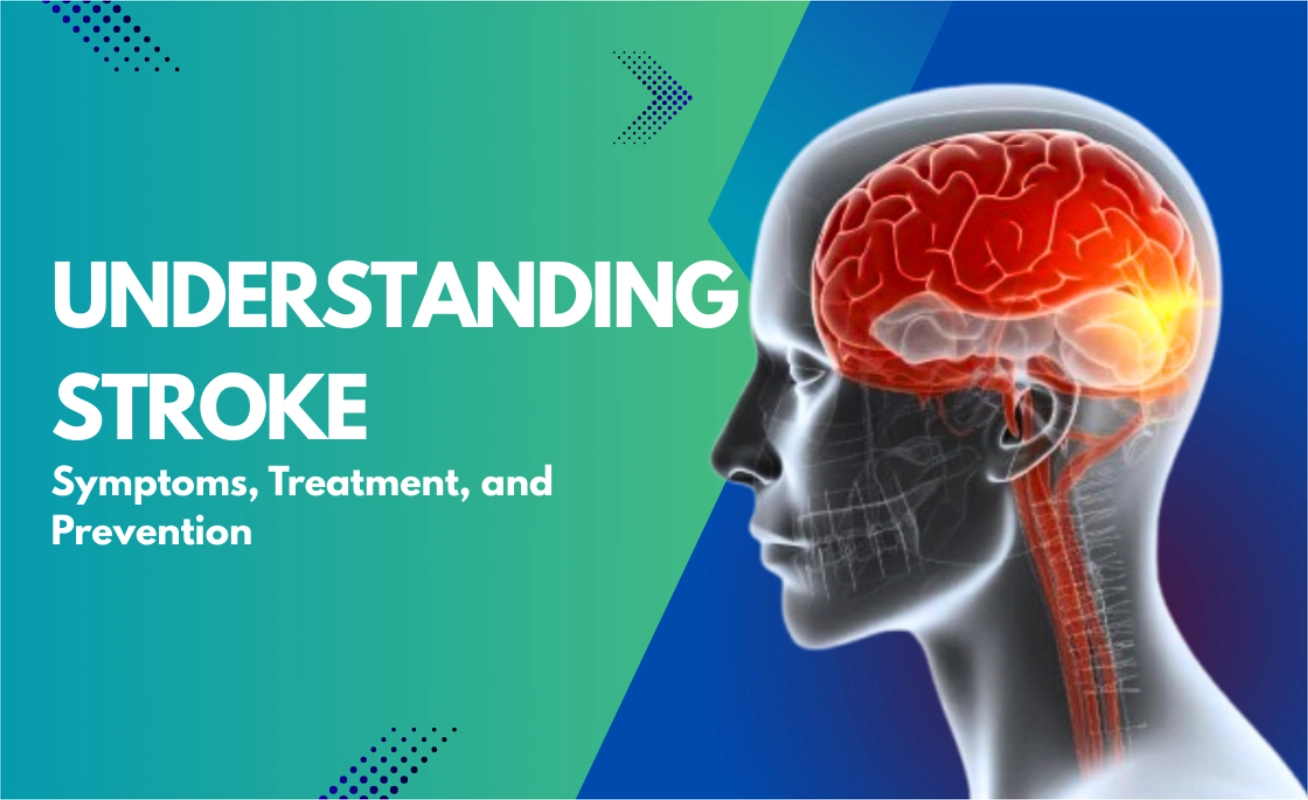
Understanding Stroke – Symptoms, Treatment, and Prevention
Introduction
Stroke—often termed a “brain attack”—is a critical medical emergency caused by the interruption of blood flow to the brain. In India, this remains a leading cause of death and long-term disability. In this blog, Medaz Hospital aims to guide patients and families through the critical aspects of recognizing, treating, and preventing stroke.
1. Recognizing the Symptoms of Stroke
Early recognition is vital. Look for:
- Sudden facial drooping, arm weakness, speech difficulty (the FAST signs), and now including balance and vision changes (BE FAST) to detect posterior strokes
- Additional signs: dizziness, confusion, numbness on one side, sudden vision loss, or the “worst headache ever”—especially indicative of hemorrhagic stroke
Why it matters: Every minute counts—ischemic stroke can destroy ~2 million brain cells per minute. Treatment within 90 minutes offers a 90% chance of independence; delays reduce that dramatically
2. Understanding Types and Treatment of Stroke
- Ischemic stroke (most common): caused by clots blocking blood flow.
- Hemorrhagic stroke: caused by bleeding within the brain
- Ischemic strokes: Treated urgently with clot-dissolving drugs (thrombolysis) or mechanical removal (thrombectomy).
- Hemorrhagic strokes: Focus on blood pressure control, preventing spasms, and sometimes surgery to relieve pressure or remove pooled blood.
- Post-stroke rehabilitation: Includes physiotherapy, speech therapy, and occupational therapy—critical for regaining function over many months.
3. Prevention: Your Best Defense
- Hypertension: The biggest modifiable contributor—lowering blood pressure reduces stroke risk by up to 40%.
- Atrial fibrillation, high cholesterol, diabetes, smoking, obesity, alcohol misuse, sedentary lifestyle—all increase stroke risk.
- Lifestyle changes: Healthy diet, regular exercise, quit smoking, and moderate alcohol intake.
- Medical interventions: Aspirin or statins when prescribed; surgery like carotid endarterectomy for selected patients; anticoagulants for those with atrial fibrillation.
- Structured stroke prevention programs and digital health tools improve long-term adherence and outcomes.
4. Stroke in India: A Growing Concern
- India faces over 1.5 million strokes annually, with 70–80% being ischemic.
- Risk factors like hypertension, diabetes, smoking, and lifestyle changes contribute significantly.
- In the northeastern states, stroke prevalence is approximately 1.53% among adults aged 45+, with factors like age, inactivity, and socioeconomic status elevating risk.
Understanding Stroke: Symptoms, Treatment, and Prevention
Presented by Medaz Hospital – Patna’s Trusted Multispecialty Care
A stroke is a medical emergency that occurs when blood flow to the brain is interrupted or reduced, depriving brain tissue of oxygen and nutrients. In India, where lifestyle-related health issues are rising, stroke is becoming one of the leading causes of disability and death. At Medaz Hospital, Patna Bihar, we aim to increase awareness and provide prompt, life-saving care to those at risk.
Common Symptoms of Stroke
Use the BE FAST method to spot the signs early:
- B – Balance: Sudden loss of coordination or balance
- E – Eyes: Blurred or double vision
- F – Face: One side of the face droops
- A – Arms: Weakness or numbness in one arm
- S – Speech: Slurred or strange speech
- T – Time: Call emergency services immediately
“Every minute after a stroke, the brain loses about 1.9 million neurons.”
Types of Stroke
- Ischemic Stroke – Caused by a blockage or clot in blood vessels (~80% of all strokes)
- Hemorrhagic Stroke – Caused by a ruptured blood vessel in the brain
- Transient Ischemic Attack (TIA) – A mini-stroke, which is a warning sign of major stroke
Stroke Treatment at Medaz Hospital
- Emergency Care: Stroke-ready unit with 24×7 neurology and radiology support
- Clot-busting Medications (tPA) for ischemic stroke (must be administered within 3–4.5 hours)
- Mechanical Thrombectomy for removing large clots
- Surgical Intervention for hemorrhagic stroke
- Post-Stroke Rehabilitation: Speech therapy, physiotherapy, and counseling
We follow the Golden Hour Protocol – because timing is critical.
Prevention: Your Best Protection
Preventive Steps to Reduce Stroke Risk:
- Control high blood pressure
- Manage diabetes and cholesterol
- Quit smoking and alcohol abuse
- Eat a heart-healthy diet and stay active
- Monitor and treat atrial fibrillation (AFib)
Why Choose Medaz Hospital, Patna?
- Advanced Neuro ICU
- Emergency Stroke Response Team
- CT Scan in Minutes
- 24×7 Emergency Services
- Patient-centric Rehabilitation Programs
Frequently Asked Questions (FAQs)
Q1. How do I know if someone is having a stroke?
Use the BE FAST method to check for balance, eye changes, facial drooping, arm weakness, slurred speech, and act fast.
Q2. Can stroke be treated if detected early?
Yes. Treatment like clot-dissolving injections is highly effective if given within the first 3–4.5 hours.
Q3. What is the difference between a stroke and a mini-stroke (TIA)?
A TIA (Transient Ischemic Attack) is a temporary blockage and doesn’t cause permanent damage but is a warning sign for future stroke.
Q4. How can I reduce the risk of a second stroke?
Control blood pressure, manage diabetes, avoid smoking/alcohol, eat healthily, and take medications regularly.
Q5. Does Medaz Hospital offer rehabilitation services after stroke?
Yes, we have a comprehensive rehab program including physiotherapy, speech therapy, and lifestyle counseling.
Q6. Is stroke hereditary?
While family history may play a role, lifestyle factors like high BP, smoking, and obesity are stronger indicators.
Q7. What tests are done to confirm a stroke?
CT scan, MRI, blood tests, and heart function tests (ECG, echocardiogram) are typically used.
Stroke is beatable—but only with awareness, speed, and care.
At Medaz Hospital, Patna Bihar, we bring together advanced infrastructure, expert neurologists, and emergency services to ensure every second counts when it comes to stroke.
Note: This blog is for informational purposes only and should not replace professional medical advice.
𝐄𝐧𝐪𝐮𝐢𝐫𝐲 & 𝐀𝐩𝐩𝐨𝐢𝐧𝐭𝐦𝐞𝐧𝐭 : 𝟎𝟗𝟏𝟏𝟕𝟔 𝟎𝟎𝟔𝟎𝟎
𝐄𝐦𝐞𝐫𝐠𝐞𝐧𝐜𝐲 𝐚𝐧𝐝 𝐀𝐦𝐛𝐮𝐥𝐚𝐧𝐜𝐞: 𝟎𝟗𝟏𝟏𝟕𝟓𝟎𝟎 𝟓𝟎𝟎
𝐰𝐞𝐛𝐬𝐢𝐭𝐞 — https://www.medazhospital.com/neurosurgery/
𝗬𝗼𝘂𝘁𝘂𝗯𝗲 𝗟𝗶𝗻𝗸 –www.youtube.com/@medazhospital





